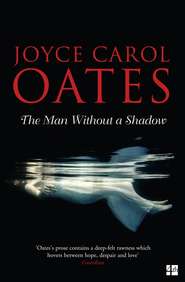По всем вопросам обращайтесь на: info@litportal.ru
(©) 2003-2024.
✖
Carthage
Автор
Год написания книги
2018
Настройки чтения
Размер шрифта
Высота строк
Поля
As if, in the strain of awaiting the call, and hearing Cressida’s voice, she’d forgotten what that voice was.
DRIVING TO THE BANK, fumbling with the radio dial, in a panic to hear the “top of the hour” news—almost colliding with a sanitation truck.
Recovering, and, in the next block, almost colliding with an SUV whose driver tapped his horn irritably at her.
And, in the bank, bright-faced and smiling in the (desperate, transparent) hope of deflecting looks of pity, waiting in line at a teller’s window exactly as she’d have waited if her daughter was not missing.
This fact confounded her. This fact seemed to mock her.
Wanting to hide. Hide her face. But of course, no.
“Arlette? You are Arlette Mayfield—aren’t you? I’m so sorry—really really sorry—about your daughter . . . We’ve told our kids, one is a junior in high school, the other is just in seventh grade, if they hear anything—anything at all—to tell us right away. Kids know so much more than their parents these days. Out at the lake, and in the Preserve, there’s all kinds of things going on—under-age drinking is the least of it. All kinds of drugs including ‘crystal meth’—kids don’t know what they’re taking, they’re too young to realize how dangerous it is . . . I don’t mean that your daughter was with any kind of a drug-crowd, I don’t mean that at all—but the Roebuck Inn, that’s a place they hang out—there’s these Hells Angels bikers who are known drug-dealers—but parents have their heads in the sand, just don’t want to acknowledge there’s a serious—tragic—problem in Carthage . . .”
And not in the bank parking lot, can’t let herself cry. Not with bank customers trailing in and out. And anyone who knew Arlette Mayfield, including now individuals not-known to her who’d seen her on WCTG-TV with her husband Zeno pleading for the return of their daughter, could stare through her car windshield and observe and carry away the tale to all who would listen with thrilled widened eyes That poor woman! Arlette Mayfield! You know, the mother of the missing girl . . .
CALLS CONTINUED TO COME to police headquarters.
Though peaking on the second day, Monday, July 11: a record number of calls following the front-page article, with photos, in the Carthage Post-Journal. And the notice of the ten-thousand-dollar reward.
Myriad “witnesses” claiming to have sighted Cressida Mayfield—somewhere. Or to have knowledge of what might have happened to her and where she was now.
In some cases, making veiled accusations against people—(neighbors, relatives, ex-husbands)—who might have “kidnapped” or “done something to” Cressida Mayfield.
Zeno had wanted these calls routed through him. It was his fear that a valuable call would be overlooked by someone in the sheriff’s office.
Detectives explained to Zeno that, where reward money is involved, a flood of calls can be expected, virtually all of them worthless.
Yet, though likely to be worthless, the calls have to be considered—the “leads” have to be investigated.
The Beechum County Sheriff’s Department was understaffed. The Carthage PD was helping in the investigation though this department was even smaller.
If kidnapping were suspected, the FBI might be contacted. The New York State Police.
Was offering a reward so publicly a mistake? Zeno didn’t want to think so.
“Maybe the mistake is not offering enough. Let’s double it—twenty thousand dollars.”
“Oh, Zeno—are you sure?”
“Of course I’m sure. We have to do something.”
“Maybe you should speak with Bud McManus? Or maybe—”
“She’s our daughter, not his. Twenty thousand will attract more attention. We have to do something.”
Arlette thought But if there is nothing? If we can do nothing?
There was Zeno on the phone. Defiant Zeno on two phones at once: the family phone, and his cell phone.
“Hello? This is Zeno Mayfield. We’ve decided to double the reward money to twenty thousand dollars. Yes—right. Twenty thousand dollars for information leading to the recovery and return of our daughter Cressida Mayfield. Callers will be granted anonymity if they wish.”
IN CRESSIDA’S ROOM. Drifting upstairs in the large empty-echoing house as if drawn to that room.
Where, if she’d been home, and in the room, Cressida would have been surprised to see her parents and possibly not pleased.
Hey, Dad. Mom. What brings you here?
Not snooping—are you?
“Her bed wasn’t slept-in. That was the first thing I saw.”
Arlette spoke in a hoarse whisper. They might have been crouched in a mausoleum, the room was so dimly lighted, so stark and still.
In the center of the room Zeno stood, staring. It was quite possible, Arlette thought, that he hadn’t entered their daughter’s room in years.
Detectives had asked Arlette if anything was “missing” from the room. Arlette didn’t think so, but how could Arlette know: their daughter’s life was a very private life, only partially and, it sometimes seemed, grudgingly shared with her mother.
Detectives had searched the room, as Arlette and Zeno stood anxiously by. As soon as the detectives were finished with any part of the room—the closet, the old cherrywood chest of drawers Cressida had had since she was six years old—Arlette hurried to reclaim it, and re-establish order.
With latex-gloved hands they’d placed certain articles of clothing in plastic bags. They’d taken a not-very-clean hairbrush, a toothbrush, other intimate items for DNA purposes presumably.
Cressida’s laptop. They’d asked permission to open it, to examine it, and the Mayfields had said yes, of course.
Though reluctant even to open the laptop themselves. To peer into their daughter’s private life, how intrusive this was! How Cressida would resent it.
The detectives had taken it away with them, and left a receipt.
Almost Arlette thought I hope they return it before Cressida comes back.
Almost Arlette thought, unforgivably, I hope Cressida doesn’t come back before they return it.
Zeno said, falsely hearty: “It’s good that you woke up, Lettie. That something woke you. Thank God you came in here when you did.”
“Yes. Something woke me . . .”
That sensation of a part of the house missing. A part of her body missing. Phantom limb.
Arlette’s thought was, seeing the room through Zeno’s eyes, that it didn’t have the features of a girl’s room, as a man might imagine them.
Cressida’s clothes were all put away and out of sight—neatly folded in drawers, on shelves, hanging in closets. And her small stubby-looking shoes, neatly paired, on the floor of the closet.
One of the detectives, meaning to be kind, had remarked that his teenaged daughter’s room looked nothing like this one.
Zeno had tried to explain, their daughter had never been a teenager.
Years ago Cressida had cast away the soft bright colors and fuzzy fabrics of girlhood and replaced them with the stark black-and-white geometrical designs and slick surfaces of M. C. Escher, that so strangely entranced her. She had so little interest in colors—(her jeans were mostly black, her shirts, T-shirts, sweaters)—Arlette could wonder if she saw colors at all; or, seeing, thought them sentimental, softhearted.
Zeno was peering at the labyrinthine Descending and Ascending as if he’d never seen it before. As if it might provide a clue to his daughter’s disappearance.











